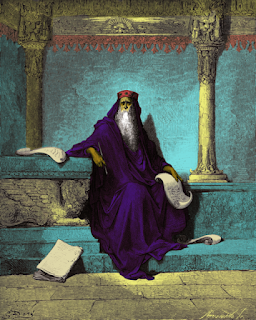Some men are called to govern others: “There is no authority except from God“, “The Most High rules the kingdom of men and gives it to whom he will.”
That does not mean God approves of all rulers or the decisions they make. He once elevated Pharaoh, a proud pagan tyrant, and then publicly humbled him. God said, “For this purpose I have raised you up … so that my name may be proclaimed in all the earth.”
Solomon too was raised up by the Lord.
Reasons to be Raised
One reason was to show the futility of trying to get all we can out of the “good” things that come our way, or are even God’s gifts to us. Among the good things Solomon so fully investigated were wisdom, knowledge and pleasure. The king showed some of what he learned in governing Israel but, in the end, not himself.
Solomon’s biography reveals he failed dismally to exemplify the values he recorded and the virtues he admired. If wisdom is the way to apply knowledge (Proverbs), why did he fail to apply it in so many ways? If the accumulation of wealth is but vanity in the end (Ecclesiastes), why did he hoard so much treasure? If love and lust are not to be compared (Song of Solomon), why so many wives and concubines?
It is said that personal experience is a great teacher. Yes, but a costly one. Instead, all of us may learn from the king’s experience. None need go that route, for Solomon has “been there and done that” before we were born. God allowed him to explore and even indulge himself in all the things his position brought to his doorstep. But we must not think that God was responsible for the way Israel’s ruler responded to their appeal and fell under their power. God did not tempt him. “Each person is tempted when he is lured and enticed by his own desire.”
Lessons to Learn
The first lesson is obvious. You may have a form of knowledge that enables you to instruct others in something you know to be true and yet fail to benefit from it personally. The apostle Paul asks, “You then who teach others, do you not teach yourself?”
The second lesson is related: the acquisition of knowledge must be coupled with self-control. Access to wealth and the ability to express sexual desire call for the same virtue. Like Solomon, we do not have this grace naturally; it is the fruit of the Spirit, but one that believers are responsible to cultivate. Peter writes:
“His divine power has granted to us all things that pertain to life and godliness, through the knowledge of him who called us to his own glory and excellence, by which he has granted to us his precious and very great promises, so that through them you may become partakers of the divine nature, having escaped from the corruption that is in the world because of sinful desire. For this very reason, make every effort to supplement your faith with virtue, and virtue with knowledge, and knowledge with self-control ...”
Personal Holiness
Easy access to some pleasure is not sinful in itself but it still calls for self-control. Desire for sexual intimacy — designed by God to be experienced with one person of the opposite sex and within marriage — is a vulnerable area for both men and women. (Special grace is available for those forced by circumstances to live as singles, or who have chosen to do so.)
Joseph’s biography in Genesis is a more positive encouragement to personal holiness in this area than Solomon’s history provides, though the king’s Song shows that he knew that marriage is to be “held in honor”. The beloved and the shepherdess were ideals in his mind (if not speaking of a situation actually known to him) and told of a physical side to love that was free of lust. Solomon’s preaching was on a far higher level than his practice.
We may wonder that God would use a man who was such a poor example to write holy scripture. But there are others in scripture that God raised up to a position of exceptional influence so they could express his purpose publicly. That did not necessarily indicate God’s approval of their behavior. Think of Balaam and Caiaphas.
An Application
The lessons taught in Proverbs, Ecclesiastes and in the Song of Songs were for Israel to absorb in Solomon’s time and are best understood in that setting. Proverbs has to do with a Jew’s wise behavior in this world, Ecclesiastes with that which may be observed “under the sun”, and the Song anticipates the trials and joys of a nation awaiting the return of their Messiah to earth. Heavenly blessings, secured for those who “love his appearing” in this age are not foreseen and the Church is not spoken of. That revelation awaited our Savior’s resurrection from the dead and the descent of the Holy Spirit.
Nevertheless, our Beloved calls us today to strive for holiness, to abstain from evil, to flee youthful passions, and to make no provision for the flesh. For some of us that will mean a bonfire for some books, or for more diligent policing of our media habits. Strength for whatever form of self-control may be needed is only available to those who characteristically meditate on our Bridegroom’s word throughout each day.
— Colin Anderson, November 2014
___________________________
Colorized version of Gustave Doré’s “King Solomon in Old Age” (1866) by Yitzilitt, CC BY-SA 4.0.

No comments :
Post a Comment